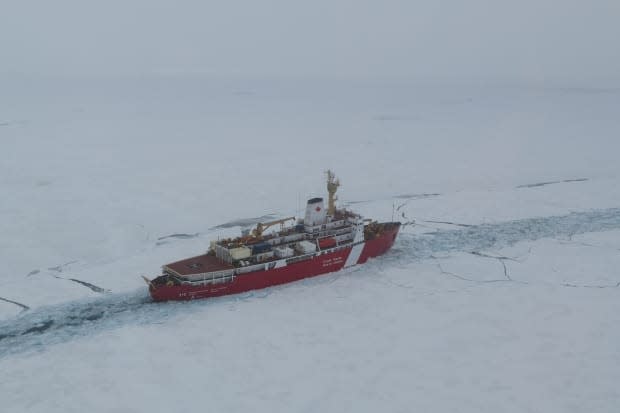Trudeau government promises coast guard two new heavy icebreakers for Arctic operations

The Canadian Coast Guard will get two new heavy icebreakers, the Liberal government announced today — a significant decision that critics say is meant to avoid making political waves ahead of the next federal election.
The decision is expected to fulfil a promise made more than a dozen years ago by the former Conservative government to build one Polar-class icebreaker at Seaspan Shipyards in Vancouver.
The Liberals also promised today to build a second vessel at Davie Shipbuilding in Levis, Que., once the company is formally admitted to the National Shipbuilding Strategy.
By promising two ships and splitting the work, the government avoids the political consequences of having to decide between competing shipyards in B.C. and Quebec in what could be an election year.
Bloc Quebecois Leader Yves-Francois Blanchet today accused the Liberals of playing politics. That charge was denied by the three federal cabinet ministers taking part in today's virtual press conference; they insisted the addition of the second vessel is about securing the Arctic, providing support for remote communities and maintaining a year-round presence in the Far North.
Two years ago, the federal government set aside $15.7 billion to rebuild the aging coast guard fleet. Many of its vessels are more than three decades old.
No cost estimate for the new icebreakers was released. Fisheries Minister Bernadette Jordan, who is responsible for the coast guard, said price tags will be released once contracts are negotiated with the individual yards.
She also pledged the ships would be built concurrently, with the first ship entering service in 2030 and the second one following soon afterwards.
The new ships are intended to replace the coast guard's principal heavy icebreaker, the CCGS Louis S. St-Laurent, which is almost 55 years old.
A 'game-changer'
"The new Polar icebreakers will be a game-changer for Canada's marine industry, both in their construction and the difference that a stronger presence in the Arctic will make," said Jordan, who was joined for the announcement by Government House leader Pablo Rodriguez and Environment Minister Jonathan Wilkinson.
"Built by Canadian shipyards, these vessels will enable the coast guard to conduct critical science, supply and other missions in our Arctic region year-round. Under the National Shipbuilding Strategy, we're putting thousands of Canadians to work building a fleet that will serve those communities for decades."
The future of the heavy icebreaker plan has been in question since the summer of 2019 when the single-ship program, originally given to Seaspan Shipyards, was mysteriously dropped from the company's work schedule.
WATCH: Fisheries minister announces plans to build two new icebreakers
Both Seaspan and Davie have lobbied hard to build the ship, already designated as the CCGS John G. Diefenbaker. That vessel was originally budgeted by the Conservative government at $721 million and was supposed to have been delivered four years ago.
But the retooling of the Vancouver yard, technical problems and construction delays caused the program to be pushed back repeatedly.
Federal officials said today that, so far, three Offshore Fisheries Science Vessels (OFSV) and 18 smaller vessels have been delivered to the coast guard under the National Shipbuilding Strategy, along with two refitted medium interim icebreakers.

Those medium icebreakers were converted from civilian use by Davie — which has attempted to set itself apart from the rest of the industry by creating a National Icebreaker Centre, which focuses on Arctic research and maritime engineering.
In order to hold on to its contract, Seaspan has focused its lobbying efforts on the economic benefits current and future ship construction brings to B.C. The company continued with that theme on Thursday in its response to the federal announcement today.
"This is an important day for Seaspan employees and suppliers, and for shipbuilding in Canada and B.C.," said Mark Lamarre, the chief executive officer of Seaspan Shipyards. "With the Polar program, we can keep the [National Shipbuilding Strategy] working as the important economic engine and strategic national asset it was designed to be."
In a statement, the chief executive officer of the Davie Shipyard said the company is pleased to be building the "flagship" of the Canadian Coast Guard.
"We also fully agree with Canada that time is now of the essence," said James Davies. "We must start the project without delay to ensure the Polar offers immediate, material and sustainable stimulus to the pandemic recovery."
The federal Conservatives were cautious in their reaction, calling the commitment to Seaspan a re-anncouncement of something the former government had engineered, and pointing out that the inclusion of Davie was still tentative because the company hasn't been admitted to the shipbuilding program yet.
"The announcement made by the Trudeau Liberals in no way guarantees that Davie Shipyards in Quebec will also get a contract to build a heavy icebreaker," said Pierre Paul-Hus, the Conservative critic for Public Services and Procurement Canada.
"Conservatives will support a National Shipbuilding Strategy that includes Davie Shipyards, and its dual goal of providing ships for our Navy and Coast Guard while securing jobs for Canadian industry."
What the party will not support, he said, is "repeated and costly delays," which he blamed on the Liberal government.
The plan comes a little more than two months after the federal auditor general complained that the overall shipbuilding strategy, which includes both the navy and the coast guard, had been plagued by mismanagement and delays.

